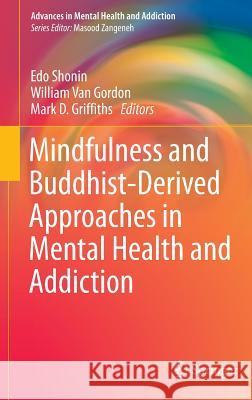Mindfulness and Buddhist-Derived Approaches in Mental Health and Addiction » książka



Mindfulness and Buddhist-Derived Approaches in Mental Health and Addiction
ISBN-13: 9783319222547 / Angielski / Twarda / 2015 / 420 str.
Mindfulness and Buddhist-Derived Approaches in Mental Health and Addiction
ISBN-13: 9783319222547 / Angielski / Twarda / 2015 / 420 str.
(netto: 421,70 VAT: 5%)
Najniższa cena z 30 dni: 424,07
ok. 16-18 dni roboczych.
Darmowa dostawa!
Mindfulness and BuddhistDerived Approaches in Mental Health and Addiction
"The intended audience for this book consists of mental health professionals and researchers, including psychologists, psychiatrists, psychiatric social workers, psychotherapists, counselors, meditation masters, and so on. ... The book provides a useful resource of applications of mindfulness-related approaches to a variety of settings. ... this is an important book for the field of mental health as it presents an alternate paradigm of mindfulness that has potential for numerous applications and possible benefits for the patient population." (Manoj Sharma, PsycCRITIQUES, Vol. 61 (15), April, 2016)
Mindfulness and Buddhist-Derived Treatment Techniques in Mental Health and Addiction Settings.- Part 1 Mindfulness in Clinician-Patient Settings.- Compassion, Cognition and the Illusion of Self: Buddhist Notes Towards More Skilful Engagement with Diagnostic Classification Systems in Psychiatry.- Being is Relational: Considerations for Using Mindfulness in Clinician-Patient Settings.- What is Required to Teach Mindfulness Effectively in MBSR and MBCT?.- Experimental Approaches to Loving-Kindness Meditation and Mindfulness that Bridge the Gap between Clinicians and Researchers.- Part 2 Mindfulness for the Treatment of Psychopathology.- Mindfulness- and Acceptance-based Interventions in the Treatment of Anxiety Disorders.- Mindfulness for the Treatment of Depression.- Mindfulness for the Treatment of Stress Disorders.- The Emerging Science of Mindfulness as a Treatment for Addiction.- Mindfulness for the Treatment of Psychosis: State of the Art and Future Developments.- Mindfulness and Meditation in the Conceptualisation and Treatment of Posttraumatic Stress Disorder.- The Last of Human Desire: Grief, Death, and Mindfulness.- Mindfulness for Cultivating Self-Esteem.- Beyond Deficit Reduction: Exploring the Positive Potentials of Mindfulness.- Part 3 Mindfulness in Other Applied Settings.- Mindfulness and Forensic Mental Health.- Mindfulness and Work-related Wellbeing.- Is Aging a Disease? Mental Health Issues and Approaches For Elders and Caregivers.- Mindfulness and Transformative Parenting.- Mindfulness and Couple Relationships.- Index.
Edo Shonin is a research psychologist at Nottingham Trent University and has been a Buddhist monk for almost 30 years. He is Research Director of the Awake to Wisdom Centre for Meditation, Mindfulness, and Psychological Wellbeing and Spiritual Director of the Mahayana Bodhayati School of Buddhism. He sits on the International Advisory Board for Springer's journal Mindfulness and is an editorial board member of Springer's International Journal of Mental Health and Addiction. He has widely regarded as a world leading authority in mindfulness research and practice. Ven William Van Gordon is a research psychologist based at Nottingham Trent University and has been a Buddhist Monk for approximately 10 years. He is co-founder of both the Awake to Wisdom Centre for Meditation, Mindfulness, and Psychological Wellbeing and the Mahayana Bodhayati School of Buddhism. He was recently Guest Editor for a special issue on mindfulness in the International Journal of Mental Health and Addiction, and is editing a Springer (NY) book on the Buddhist Foundations of Mindfulness. Dr. Mark Griffiths is a Chartered Psychologist and Professor of Gambling Studies at the Nottingham Trent University, and Director of the International Gaming Research Unit. He has spent over 25 years in the field and is internationally known for his work into behavioral addictions. More recently, he has been researching the therapeutic benefits of mindfulness. He has published over 450 refereed research papers, three books, 120+ book chapters and over 1000 other articles.
This book provides a timely synthesis and discussion of recent developments in mindfulness research and practice within mental health and addiction domains. The book also discusses other Buddhist-derived interventions – such as loving-kindness meditation and compassion meditation – that are gaining momentum in clinical settings. It will be an essential text for researchers and mental health practitioners wishing to keep up-to-date with developments in mindfulness clinical research, as well as any professionals wishing to equip themselves with the necessary theoretical and practical tools to effectively utilize mindfulness in mental health and addiction settings.
1997-2026 DolnySlask.com Agencja Internetowa
KrainaKsiazek.PL - Księgarnia Internetowa









